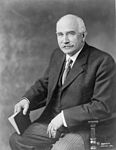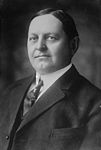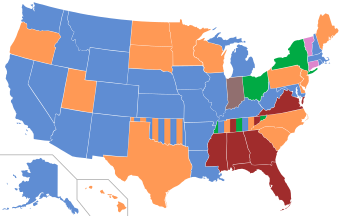From March 19 to June 4, 1912, voters of the Democratic Party elected delegates to the 1912 Democratic National Convention for the purpose of choosing a nominee for president in the 1912 election.[1]
| |||||||||||||||||||||||||||||||||||||||||||||||
1,088 delegates to the 1912 Democratic National Convention 726 (two-thirds) votes needed to win | |||||||||||||||||||||||||||||||||||||||||||||||
|---|---|---|---|---|---|---|---|---|---|---|---|---|---|---|---|---|---|---|---|---|---|---|---|---|---|---|---|---|---|---|---|---|---|---|---|---|---|---|---|---|---|---|---|---|---|---|---|
| |||||||||||||||||||||||||||||||||||||||||||||||
| |||||||||||||||||||||||||||||||||||||||||||||||
The primaries were inconclusive, with Speaker of the House Champ Clark holding a lead over Woodrow Wilson, but neither candidate close to the two-thirds of the delegates necessary to secure the nomination. In third place, Ohio governor Judson Harmon boasted the support of his home state and New York, the largest single delegation. House Majority Leader Oscar Underwood had strong support from the Deep South but little appeal outside the region.
At the convention, Wilson eventually secured the nomination over Clark after forty back-and-forth ballots.
Candidates
editNominee
editWithdrew During Convention
editWithdrew During Primaries
editResults
edit| State | Date | Woodrow Wilson | Champ Clark | Judson Harmon | John Burke |
|---|---|---|---|---|---|
| North Dakota | March 19 | 0.0% | 0.0% | 0.0% | 100.0% |
| Wisconsin | April 2 | 55.7% | 44.2% | 0.0% | 0.0% |
| Illinois | April 9 | 25.7% | 74.3% | 0.0% | 0.0% |
| Pennsylvania | April 13 | 100.0% | 0.0% | 0.0% | 0.0% |
| Nebraska | April 19 | 27.9% | 41.0% | 24.3% | 0.0% |
| Oregon | April 19 | 53.0% | 43.4% | 3.3% | 0.0% |
| Massachusetts | April 30 | 29.9% | 68.9% | 0.0% | 0.0% |
| Maryland | May 6 | 34.3% | 54.4% | 11.3% | 0.0% |
| California | May 14 | 28.5% | 71.5% | 0.0% | 0.0% |
| Ohio | May 21 | 45.7% | 1.3% | 51.7% | 0.0% |
| New Jersey | May 28 | 98.9% | 1.1% | 0.0% | 0.0% |
| South Dakota | June 4 | 35.2% | 32.0%[notes 1] | 0.0% | 0.0% |
| Legend: | 1st place (popular vote) | 2nd place (popular vote) | 3rd place (popular vote) |
|---|
See also
editNotes
edit- ^ The pro-Clark vote was split between two slates of delegates. The first one, labeled "Wilson-Clark-Bryan" received 32% while the second one, labeled "Champ Clark" received 20%. Clark's people accused the latter slate of being a scheme to split the vote. Only the votes received by the Wilson-Clark-Bryan slate are included in this total.
- ^ Favorite sons received the support of Indiana (Thomas R. Marshall) and North Dakota (John Burke).
References
edit- ^ Kalb, Deborah (2016-02-19). Guide to U.S. Elections - Google Books. ISBN 9781483380353. Retrieved 2016-02-19.









